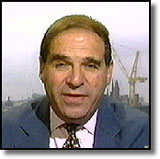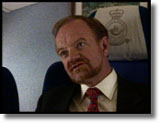
|
Blair to Mediate in Urgent Pre-Summit TalksTony Blair is seeking to play the mediator in a bid to stop the Franco-German row over the single currency from destroying this week's crucial European Union summit in Amsterdam.The Prime Minister intended to use his influence as a new leader backed by a powerful majority to help broker a deal. And, with finance ministers and officials meeting to try to agree the way ahead, it appeared that EU leaders were prepared to move heaven and earth to head off conflict. The row centres on the new French Prime Minister Lionel Jospin's fears that the strict budgetary rules governing membership of the single currency risk eclipsing economic measures essential for job-creation and the boosting of growth. The two-day summit on further European integration does not even include the single currency on the agenda - but economic and monetary union still threatened to cast a shadow over Amsterdam.
Mr Blair headed straight for a meeting with Socialist leaders after flying in to Amsterdam. He was expected to hold bilateral meetings there with France's Mr Jospin and the Dutch leader, Wim Kok, whose Dutch goverment holds the presidency and so must pilot the summit to a successful conclusion. The bones of a deal are taking shape with plans to spell out in a statement distinct from the so-called "stability pact" - the rules governing participation in EMU - the EU's commitment to cutting unemployment. But the question remained whether EU leaders could reconcile French hopes of a commitment to extra spending to create jobs with the more cautious approach of the Germans - and Britain's Mr Blair - that no extra spending be committed. A five-point plan was being floated by the Dutch presidency, committing each member state to monitor progress in cutting unemployment. Chancellor Gordon Brown has joined fellow EU finance ministers for dinner in Amsterdam insisting that Britain's calls for growth and jobs were now being recognised throughout Europe. And he emphasised that there was no contradiction between the agenda for jobs and growth and the need to maintain strict budget discipline in the running of a single currency. "I think what started as a British initiative a few days ago has become something that has been adopted by the other member states and I believe that Germany, France, and the other countries will want to endorse the proposals that we have been putting forward," he said. The two-day meeting starts on Monday, and Britain will sign the Social Chapter during the summit. However, the single currency is not on the agenda.
Anger Over Border ControlsThe Prime Minister is frustrated that the draft Euro-treaty on the table in Amsterdam still does not contain the kind of language that Government lawyers believe protects the UK from a legal challenge at some future date over the maintenance of its border controls. The fact that Mr Blair has been assured verbally that everyone recognises his case to keep frontier checks falls far short of the "cast-iron guarantees" he is demanding. The argument is a simple one: the completion of the single market for the free movement of goods, services and people involves the dismantling of the EU's physical frontiers between the member states. To compensate for giving up "internal" borders, the EU's "external" border controls with other countries will be strengthened. But Britain has always insisted that, as an island race, its internal borders with the rest of the EU are also its external borders with the rest of the world. And no British government will ever rely on border controls along the EU's immense eastern frontier to successfully combat illegal immigration, cross-border terrorism, and drugs and weapons smuggling. Ireland, inextricably bound to the UK's stance by the Northern Irish border with the Republic, has no option but to take the same course. All the new Treaty currently says is that the 13 other member states agree to remove their borders - in the jargon, that they accept the "Schengen acquis".
Leon Brittan sees way aheadVice-president of the European Commission Sir Leon Brittan has insisted there was a chance of resolving France's dispute with the EU over the stability pact.
Sir Leon also said he was "confident" a deal would be reached over Britain's demand that its right to control its own borders be legally protected. He said the row over borders was "artificial". Strength not integration
On border control he said "We go to Amsterdam to make a deal not to wreck a deal. We've always made it perfectly plain that the bottom line for us is to get a deal which gives a clear legal basis for Britain retaining control over its own external borders - something the Conservative Government never achieved in 18 years. There will be tough talking and hard bargaining and we will get a better deal for Britain."
|
Diana, Princess of Wales, 1961-1997
Conference 97
Devolution
The Archive
News |
Issues |
Background |
Parties |
Analysis |
TV/Radio/Web
Interactive |
Forum |
Live |
About This Site
News |
Issues |
Background |
Parties |
Analysis |
TV/Radio/Web
Interactive |
Forum |
Live |
About This Site
© BBC 1997 |
politics97@bbc.co.uk |



